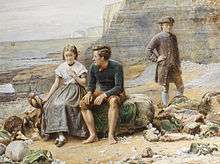Enoch Arden
"Enoch Arden" is a narrative poem published in 1864 by Alfred, Lord Tennyson, during his tenure as England's Poet Laureate. The story on which it was based was provided to Tennyson by Thomas Woolner.
Background

The hero of the poem, fisherman turned merchant sailor Enoch Arden, leaves his wife Annie and three children to go to sea with his old captain, who offers him work after he had lost his job due to an accident; in a manner that reflects the hero's masculine view of personal toil and hardship to support his family, Enoch Arden left his family to better serve them as a husband and father. However during his voyage, Enoch Arden is shipwrecked on a desert island with two companions; both eventually die, leaving Arden alone there. This part of the story is reminiscent of Robinson Crusoe. Enoch Arden remains lost and missing for more than ten years.
He finds upon his return from the sea that, after his long absence, his wife, who believed him dead, is married happily to another man, his childhood friend Philip (Annie has known both men since her childhood, thus the rivalry), and has a child by him. Enoch's life remains unfulfilled, with one of his children now dead, and his wife and remaining children now being cared for by his onetime rival.
Enoch never reveals to his wife and children that he is really alive, as he loves her too much to spoil her new happiness. Enoch dies of a broken heart.
The story could be considered a variation on and antithesis to the classical myth of Odysseus, who after an absence of 20 years at the Trojan War and at sea found a faithful wife who had been loyally waiting for him. The use of the name Enoch for a man who disappears from the lives of his loved ones is surely inspired by the biblical character Enoch. In fact also the entire chronological structure of the protagonist's life with its cycles related to the biblical symbolism of the "days of Creation" binds to the name of Enoch, as demonstrated by the analysis of an Italian thinker long interested in this work,[1] and denotes the impressive ability of Tennyson to insert theological intentions into simple elegiac mode with an unprecedented complexity in English literature.[2]
Musical settings
In 1897, Richard Strauss set the poem as a recitation for speaker and piano, published as his Op. 38. On 24 May 1962, Columbia Records released a recording of Enoch Arden (recorded 2–4 October 1961) with Glenn Gould on the piano and Claude Rains as the speaker. The LP was made at a cost of $1500 and only 2000 copies were released. It remains a collector's item.[3][4]
In popular culture
- In Evelyn Sharp's 1897 children's novel, The Making of a Schoolgirl, the girls put on a play of "Enoch Arden" for a student's birthday.
- The Guy de Maupassant story "Le Retour" has a similar plot.
- Enoch Arden, the 1911 film directed by D. W. Griffith, is based on this poem.
- The 1915 film of the same name was directed by Christy Cabanne.
- The 1925 Australian film The Bushwackers is based on this poem.
- In the 1940 screwball comedy film My Favorite Wife, the character Ellen Wagstaff Arden (Irene Dunne) is a comic inversion of Enoch Arden.
- Also in 1940 the comedy film Too Many Husbands told the story, with Jean Arthur playing the wife of the returning husband, played by Fred McMurray. It was remade in 1955 as Three for the Show, with Betty Grable, Jack Lemmon, Marge Champion and Gower Champion.
- Enoch Arden is the alias taken by Charles Trenton to suggest the survival of the deceased Robert Underhay, in Agatha Christie's 1948 crime mystery novel Taken at the Flood.
- Agatha Christie's "While the Light Lasts" was first published in the Novel Magazine in April 1924 with the deceased husband, Tim Nugent, coming back as Arden. This plot was also used to greater effect as part of Giant's Bread (1960) which was the first of her six novels written under the pseudonym of Mary Westmacott.[5]
- The 1946 film Tomorrow Is Forever, starring Claudette Colbert, Orson Welles and George Brent, is based on the poem, although no writing or adaptation credit is given to Tennyson.
- Move Over, Darling is a 1963 remake of My Favorite Wife, starring Doris Day, James Garner, and Polly Bergen. This project was undertaken after the 1962 Marilyn Monroe version, Something's Got To Give, was cancelled due to Monroe's absences from the film set.
- The 1966 Konkani film Nirmon is based on this story.
- The 1967 Hindi film Taqdeer was a remake of the Konkani film Nirmon.
- The 2000 film Cast Away was loosely based on this story.
See also
References
- ↑ Pietro De Luigi. Tracce per navigare nell'universo di Enoch Arden (2014 ed.). CreateSpace Independent Publishing Platform.
- ↑ Maria Serena Marchesi. Temi cristiani nell'opera poetica di Alfred Tennyson (2007 ed.). Congedo Editore.
- ↑ Platt, Russell. "Gould Standard". The New Yorker. Retrieved 15 August 2013.
- ↑ Peter Vidani (2 June 2013). "Freezing Tumblr". Papyh.tumblr.com. Retrieved 15 August 2013.
- ↑ Agatha Christie. While the Light Lasts (2003 ed.). HarperCollins. p. 251.